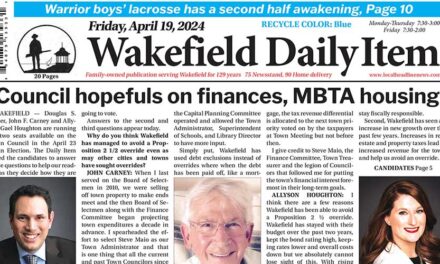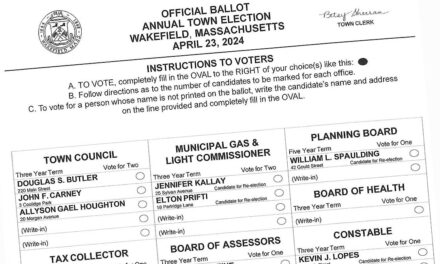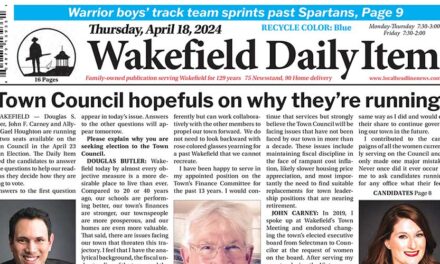By MARK SARDELLA
WAKEFIELD — Town Hall has been hearing from citizens who are concerned with the number of homes in some residential neighborhoods that are being used as short-term and long term lodging houses.
Maio said that there are homeowners in town who are advertising rooms in their homes for short term stays under a system known as “Airbnb.” Airbnb is a website where people list, find, and rent lodging. It has over 1,500,000 listings in 34,000 cities and 190 countries. Founded in August 2008 and headquartered in San Francisco, California, the company is privately owned and operated by Airbnb, Inc.
Travelers to a city or region may decide to use Airbnb as a cheaper, less formal alternative to staying in a hotel or motel.
Maio told the board that a search of the Airbnb web site reveals a number of local homeowners advertising rooms in their homes for short term lodging. He cited examples on Garden Lane, Edmunds Place, Winship Drive and Greenwood Avenue who are advertising rooms priced in the range of $65-$70 a night.
“What this does,” Maio said, “is it changes a residential neighborhood into a commercial neighborhood, which is unfair to the neighbors.”
He noted that the current Zoning Bylaw is ambiguous on this issue, so he proposed tightening up the language with an amendment to the bylaw.
Maio proposed that the Board of Selectmen sponsor an article at Nov. 16, 2015 Town Meeting that would amend the Zoning Bylaw to restrict these short-term accessory rentals in residential neighborhoods by requiring a Special Permit from the Zoning Board of Appeals.
Maio said that he had discussed such a bylaw amendment with Building Inspector Jack Roberto, Town Planner Paul Reavis and Town Counsel Thomas Mullen.
Maio also addressed the issue of houses in residential neighborhoods that are being used essentially as long-term rooming houses.
Maio noted that right now those are allowed in single residence and general residence districts. But again, Maio noted that such an operation changes the nature of a residential area for the neighbors that bought homes there.
“I’m suggesting that there is no place for these lodging units in these single residential areas,” Maio said. He said that he would be OK with such an operation in the business district by Special Permit, but maintained that long-term rooming houses should not be allowed in residential districts at all.
Maio asked the selectmen to forward a proposed Town Meeting article on to the Planning Board for a public hearing and then let Town Meeting decide the issue.
“I think a lot of people are very concerned about what has happened to their neighborhoods,” Maio said.
Selectman Betsy Sheeran said that she thought enforcing such a bylaw provision on Airbnb operations would be very difficult as the town would have to monitor the Internet to make sure it wasn’t happening locally.
Maio said that he agreed, but noted that under the current bylaw it is difficult for the town to do anything even if they do know about such operations.
Selectman Patrick Glynn said that he supported the bylaw amendment, pointing out that it would give the town something to back them up when they do approach people operating Airbnb-type establishments in their homes.
Maio stressed that under the legal definition a direct relative is not a lodger, so the proposed bylaw amendment would in no way prevent people from having family members as short-term or long-term guests in their homes.
Selectman Paul DiNocco asked if under the proposed zoning amendment there would be any “grandfathering” of current residential lodging operations.
Town Counsel Thomas Mullen said that there would be grandfathering, but only if the operator could provide proof of consistent, uninterrupted use of his property as lodging for a period of at least two years.
Chairman Ann Santos emphasized that the board was acting in response to citizen complaints.
The board voted unanimously to forward the zoning amendment to the Planning Board and to sponsor it at Town Meeting.




